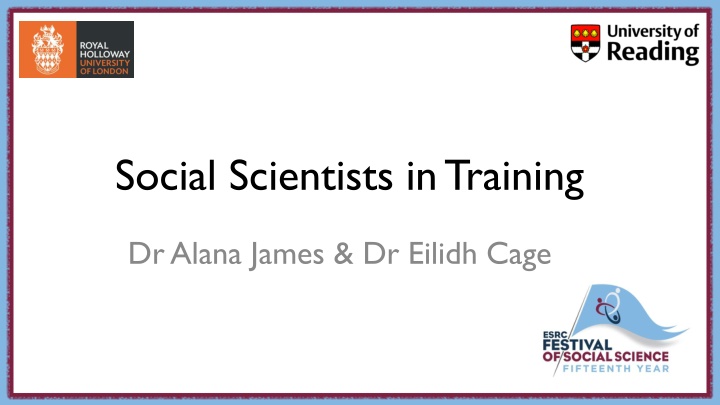
Social Scientists in Training: Introduction to Research Methods and Approaches
Dive into the world of social science research with Dr. Alana James and Dr. Eilidh Cage as they explore research methods, basic vs. applied focus, hypotheses vs. questions, and planning your study. Learn about quantitative and qualitative approaches, designing questionnaires, analyzing data, and reporting findings ethically. Get ready to embark on your own research journey in the field of social science.
Download Presentation

Please find below an Image/Link to download the presentation.
The content on the website is provided AS IS for your information and personal use only. It may not be sold, licensed, or shared on other websites without obtaining consent from the author. If you encounter any issues during the download, it is possible that the publisher has removed the file from their server.
You are allowed to download the files provided on this website for personal or commercial use, subject to the condition that they are used lawfully. All files are the property of their respective owners.
The content on the website is provided AS IS for your information and personal use only. It may not be sold, licensed, or shared on other websites without obtaining consent from the author.
E N D
Presentation Transcript
Social Scientists in Training Dr Alana James & Dr Eilidh Cage
Introduction to research in social science Dr Alana James
What is social science? Video: https://www.youtube.com/watch?v=BiLj35g_cAU
Basic vs. Applied Focus on improving understanding of something, regardless of social application vs. Focus on addressing a real-world problem Not always separate!
Research approaches Quantitative Testing hypotheses (predictions) Looking for associations between variables Numerical data Qualitative Exploring open questions May compare groups of people but no manipulation or conditions Open responses Mixed methods Combination of quantitative and qualitative
Hypotheses vs. Questions Completing more homework will lead to getting a higher grade in Psychology A-level vs. What factors influence the grades people achieve in Psychology A-level?
Your study Questionnaire Focus on real-world needs in your school Could be quantitative, qualitative or mixed Open research question(s)
Planning your study Decide your research question(s) Design questionnaire Run the study Revise Analyse the data Plan your study questionnaire Report findings to school Check your study is ethical Pilot questionnaire
For the next section, work through the Planning your questionnaire study worksheet alongside the following slides
Research aims & questions What is your overall aim? Define any key terms What specific things do you want to find out? Questions need to be: specific, clear, achievable Aim: to explore wellbeing amongst pupils at our school What is the key term? What could the questions be?
Participants Population: who can provide useful information? Sample: group(s) from population chosen for study Inclusion/exclusion criteria: reasons to include/exclude Pupils? Specific year groups? Random classes? Pupils taking certain subjects? Staff? New pupils? Could the characteristics of your sample affect the results?
Where/When When will you be able to give out questionnaires? Who do you need to ask permission from? Does this limit how long your questionnaire can be? Tutor time? Breaks/Lunchtimes? In classes? Could the time and place you choose affect the results?
Timescale Need a realistic plan Where/when can you work on your research? When will you be ready to collect data? How long will it take to collect enough answers? How long will you need to analyse the data? When can you present the findings to school? Will you have enough time even if something goes wrong?






















